Finding the best split testing platform can be challenging, especially with so many choices available. If you’re unsure which tool will deliver good results for your conversions, this blog post will show you the top split testing tools to help you make the right decision and optimize your website effectively!
Contents
ShowTop 20 Split Testing Platforms for Your Business
Choosing the right split testing platform is crucial for optimizing your website’s performance. Here’s a list of the top 20 platforms that will help enhance your business’s conversion strategies.
1. Google Analytics 4
Google Analytics is the most widely used tool for tracking website performance. More than 37 million live websites depend on it to monitor their ads. Google is now transitioning split testing features to Google Analytics 4 (GA4) as Google Optimize is no longer available.
GA4 works smoothly with many apps and software platforms, including Webflow. Users can quickly grasp its basic features since it requires only a small amount of time to learn.
As part of Google’s complete analytics system, GA4 also works well with other services like Google Ads Manager account and Google Merchant Center.
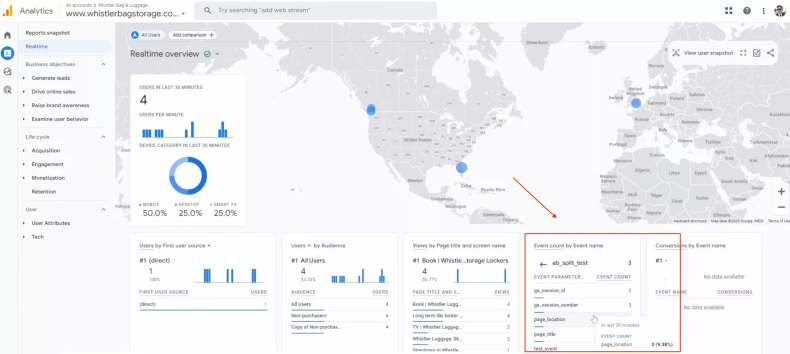
Key Features
- Integrations: Google Analytics 4 allows users to connect their split testing tools for better data analysis. By sending testing events to GA4, users can easily view and assess results directly on the GA4 dashboard.
- Split Test Tracking: GA4 enables users to monitor split testing in real-time.
- Custom Reporting: Users can define test outcomes using custom dimensions, such as testing events or default events. This feature also supports multivariate testing for more complex experiments.
- Test Results Comparison: Once the setup is complete, GA4 allows users to compare the performance of different events. This comparison makes it easier to evaluate how each variant performs against the control.
Pricing: Free
2. VWO
If you need a comprehensive split testing tool, VWO is a great choice to run experiments, improve conversion rates, and conduct usability testing. Many large enterprises rely on VWO’s platform for advanced testing and optimization.
For non-technical users, VWO offers a free version that makes it simple to test landing pages without needing coding skills. This free tier is a convenient option for basic testing needs.
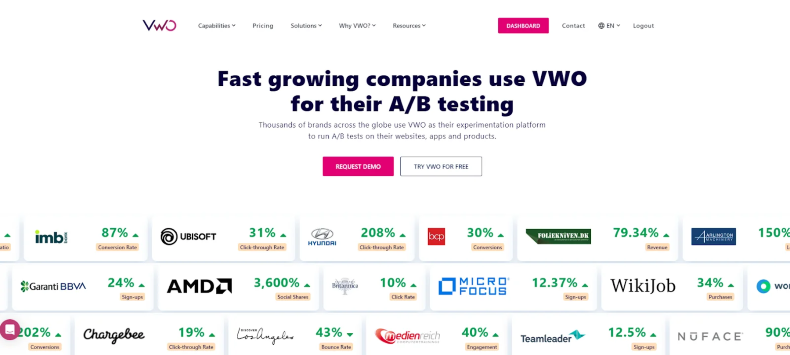
Key Features
- Heatmaps and Session Recordings: These tools highlight user behavior and show areas attracting the most attention or causing visitors to drop off.
- Server-Side Testing: New features can be tested on the server side without disrupting the customer experience. This approach is perfect for experimenting with visual designs or indexing methods.
- Split URL Testing: Traffic can be split between two distinct URLs. This setup allows for testing various layouts, multi-page flows, or subtle design changes to determine which version leads to higher conversion rates.
Pricing
- Up to 50k visitors per month: Free
- Up to 100k visitors per month: $199 per month
3. Dynamic Yield
For advanced omnichannel personalization solutions, you should use Dynamic Yield. Since it allows businesses to track and analyze user interaction, you can segment and quantify every user response and dynamically adjust your content.
Most importantly, you can continuously run split tests and optimize multiple platforms, including desktop, mobile websites, and apps.
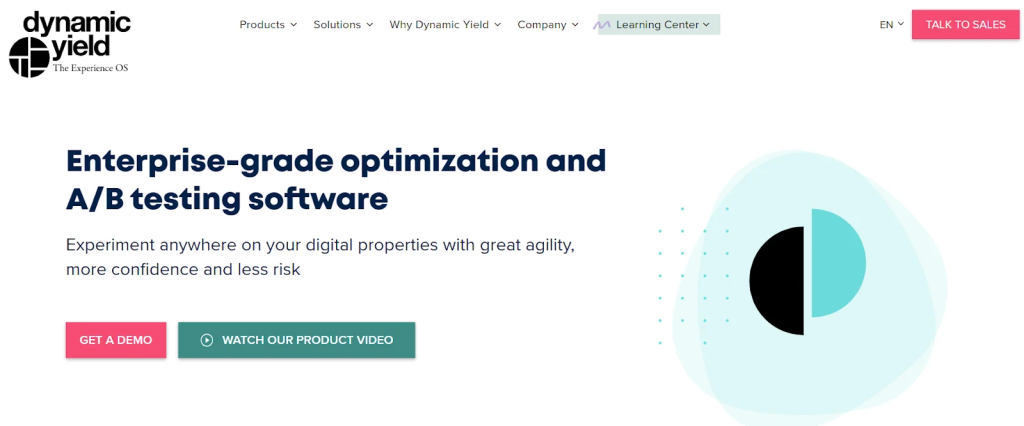
Key Features
- Process Optimization: This platform enables businesses to create, launch, and test personalized campaigns.
- Predictive Targeting: By analyzing how different audience segments respond to various content versions, the predictive targeting feature automatically adjusts to deliver the best experience for each visitor.
- Development of Targeting Rules: Businesses can design customized and optimized experiences for digital users by setting targeting rules based on customer actions, cookie data, or specific business guidelines.
- Testing Across Multiple Channels: Split tests can be run across various channels, allowing companies to optimize content, product recommendations, notifications, overlays, and more on websites, mobile apps, and emails.
Pricing: available on request.
4. Unbounce
As a landing page builder, Unbounce offers powerful tools for improving conversion rates through split testing and analytics. With access to over 100 templates, users can also create custom landing pages easily using the drag-and-drop editor without coding skills.
Additionally, the platform provides real-time reporting on split test outcomes, so users can monitor key metrics like conversion rates, CTRs, and bounce rates.
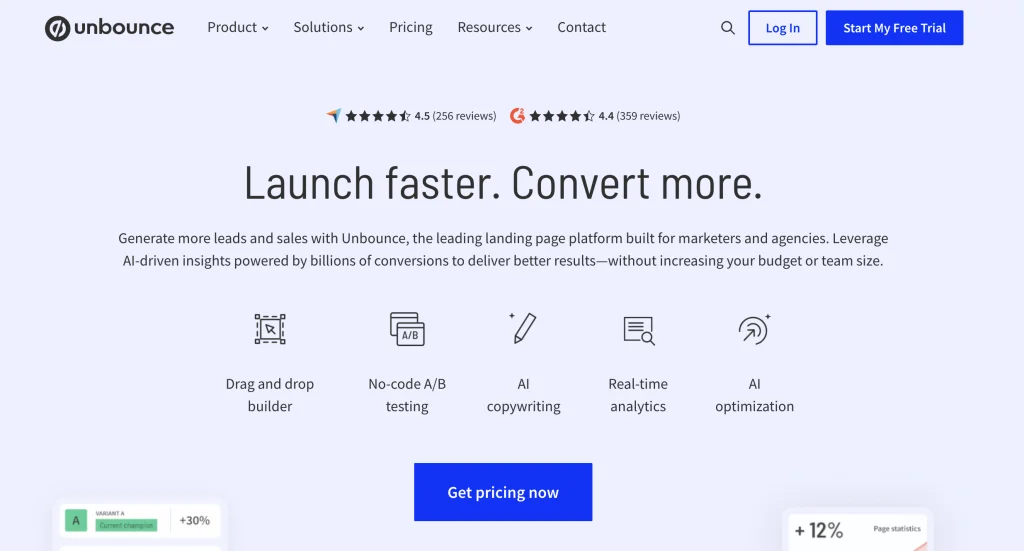
Key Features
- Creating Campaigns: Unbounce allows you to build custom landing pages. These pages could be optimized for mobile devices.
- Generating Content: The Smart Copy feature helps you quickly generate content for landing pages, ads, and emails. It allows you to create, modify, and expand brand-compliant text.
- Customizing Conversions: With Smart Traffic, Unbounce automatically directs visitors to the landing pages that best match their needs.
Pricing
- ‘Launch’ package: $72 per month
- ‘Optimize’ package: $108 per month
- ‘Accelerate’ package: $180 per month
- ‘Scale’ package: $ 270 per month.
5. Crazy Egg
Crazy Egg is a split testing software that improves the performance of the website by experimenting with different page variations, layouts, and content. The tool gives you valuable insights into where visitors click, scroll, and engage on your site.
It’s perfect for marketing departments, designers, and product teams who try to improve engagement, increase conversion rates, and generally improve the user experience for growth.
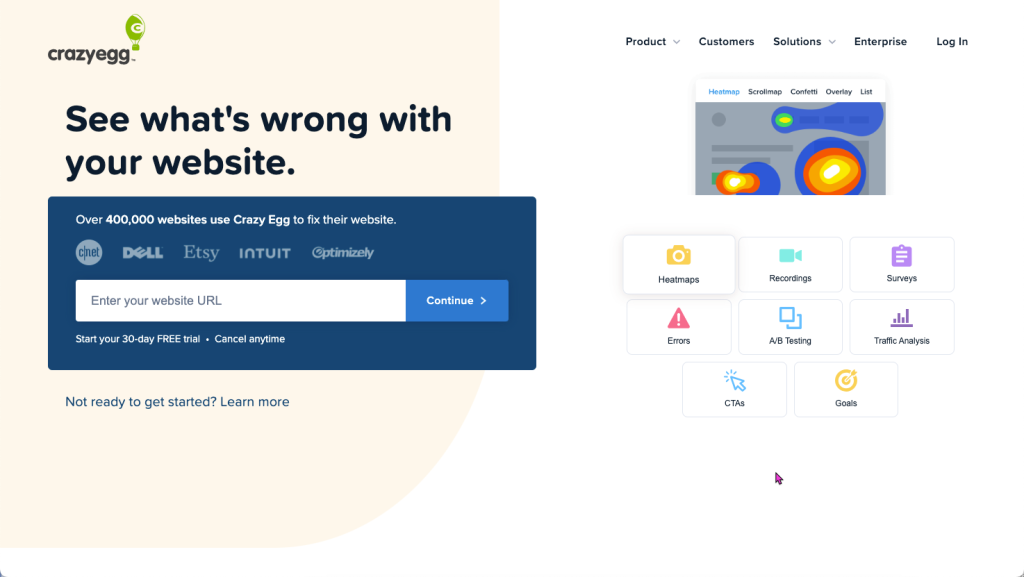
Key Features
- Visual Editor: The visual editor creates test variations completely free from any coding, thus making it highly user-friendly.
- Multiple Collection Points: You can collect valuable information using heatmaps, session recordings, and clickstream tracking, letting you build a transparent picture of site visitor interactions.
- In-Depth Reports: Crazy Egg has detailed reports including Confetti report and Clickmaps.
Pricing: From $24 per month with a 30-day free trial
6. GrowthBook
GrowthBook is designed for product teams who need a customizable platform without building it themselves. As an open-source platform for feature flags and split testing, it enables teams to deploy code more efficiently and analyze experiments.
GrowthBook emphasizes feature flagging as a crucial part of the development workflow. It can be used in various ways, including as a full-stack platform, a plugin for feature flagging, or as an analysis tool.
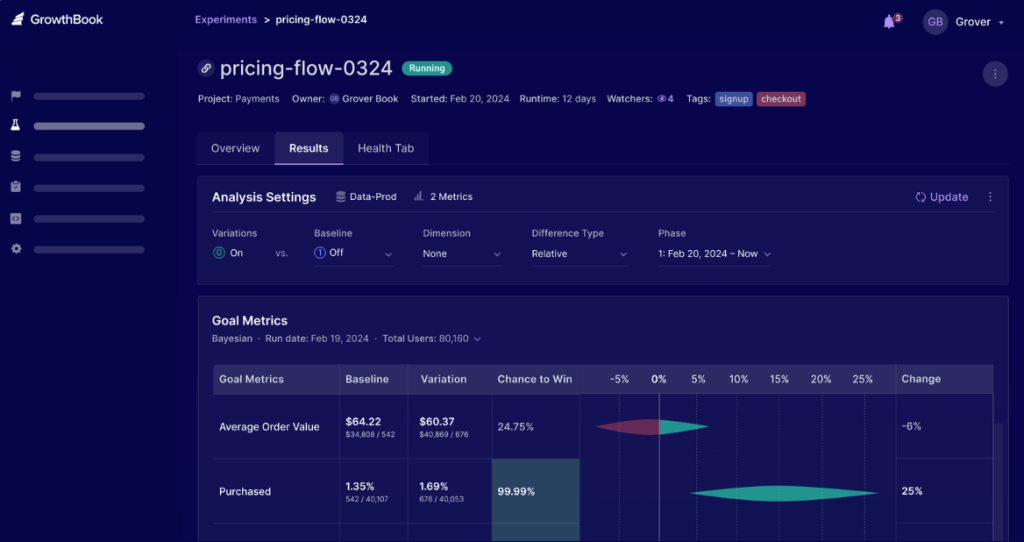
Key Features
- Lightweight SDKs: The platform includes lightweight SDKs that ensure fast integration and smooth performance.
- Easy to Implement: GrowthBook is simple to set up, requiring no special data or engineering resources.
- Self-Hosted Options: You can choose between self-hosting or using managed services, depending on your team’s preferences and needs.
Pricing
- Open source (MIT license): free.
- Hosted version: $20 per user per month.
7. Convert
For small to medium-sized businesses, Convert is an excellent choice. It is known for its top-notch customer support through live chat.
The platform provides a drag-and-drop system, making it easy to create split tests with the visual editor. For more advanced customization, the style sheet editor can be used for dynamic pages.
It also ensures a seamless onboarding process with your CMS and eCommerce platform, along with Google Analytics. Additionally, it offers personalization features, allowing you to create detailed customer profiles using over 35 different elements.
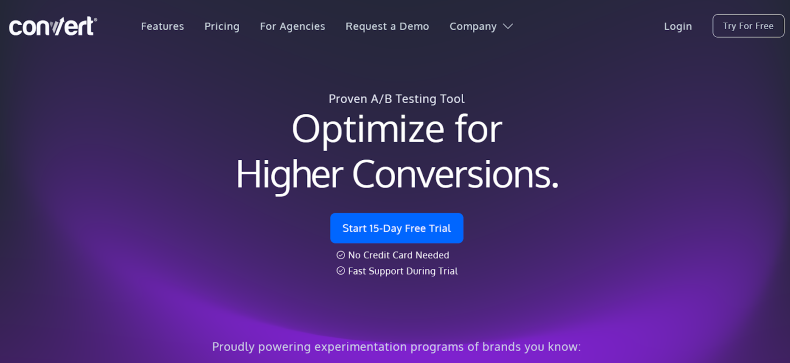
Key Features
- Audience Targeting Engine: The platform offers an audience-targeting engine with more than 40 filtering options, including a visual editor, post-segmentation tools, and a code editor.
- AI-Based Features: Convert includes AI-powered text suggestions to help improve content and generate variations for split testing.
Pricing
- Entry: $199/month for up to 100K monthly tracked users
- Specialist: $999/month for up to 400K monthly tracked users
- Pro: $1,699/month for up to 700K monthly tracked users
- Enterprise: Available on request
8. Statsig
Statsig is a platform built for feature management and experimentation to help users launch, test, and analyze new features.
It includes five integrated tools that allow users to experiment, track user behavior, analyze data, and manage feature settings all from a single interface. This approach makes it easy to handle new updates without needing multiple platforms.
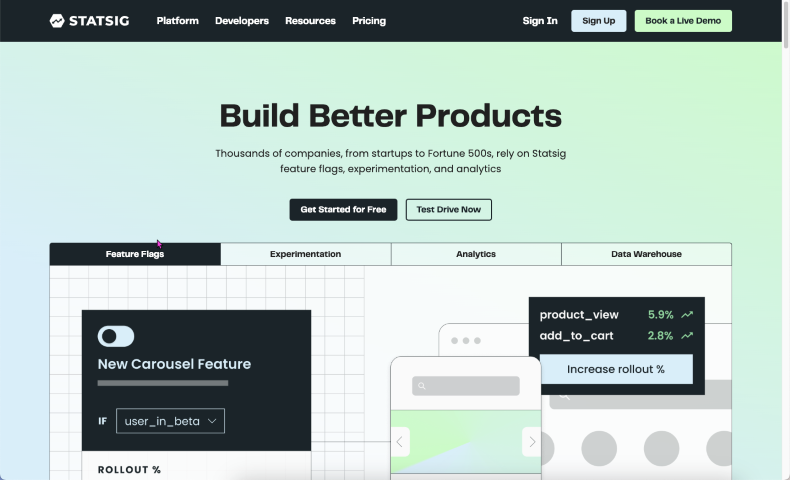
Key Features
- No-code web analytics: This feature allows users to analyze web data without writing any code. It makes tracking and understanding website performance simple and accessible for everyone.
- Multi-armed bandit testing: With this tool, users can automatically adjust experiments to deliver the best-performing option. It continuously optimizes tests for better results over time.
Pricing
- Developer: Free
- Pro: $150/month
- Enterprise: Available on request
- Warehouse: Available on request
9. Apptimize
With a focus on improving mobile app performance, Apptimize aims to boost user engagement and drive higher revenue. It tracks the impact of changes across several channels, including mobile apps, mobile sites, and call centers.
The platform is a versatile solution for experimentation, optimization, and feature releases. Users can run A/B split testing across different platforms from a centralized dashboard and manage releases with staged rollouts.
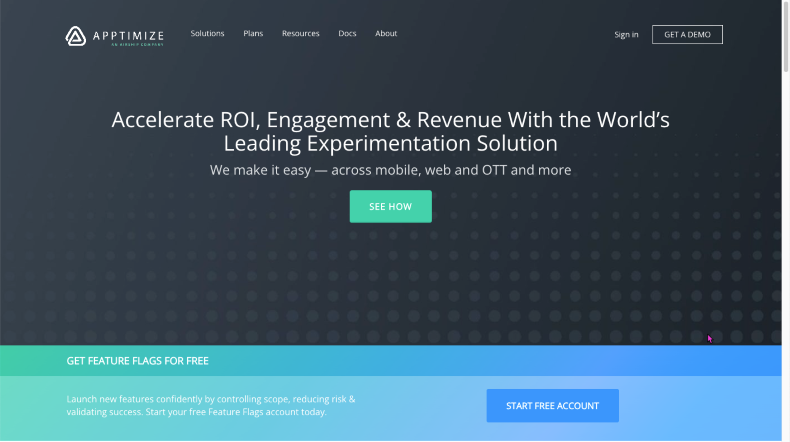
Key Features
- A/B testing tool: Run A/B, multivariate, and split tests on both iOS and Android apps.
- Code editor: Apply complex changes by using custom code blocks, offering flexibility for advanced testing.
- Dynamic variable testing: Test app variables directly from the dashboard to quickly see how changes impact performance.
Price: Both free and paid versions with a 30-day free trial
10. Kameleoon
Kameleoon is an A/B split testing tool featuring experimentation and AI-driven personalization. It excels in providing data-driven insights, advanced features, and flexible integrations.
The tool is well-known for its security and privacy in data and is preferred across different industries such as healthcare, financial services, and insurance.
Additionally, all major marketing technology tools, from Shopify Plus to Git, integrate seamlessly with this tool.
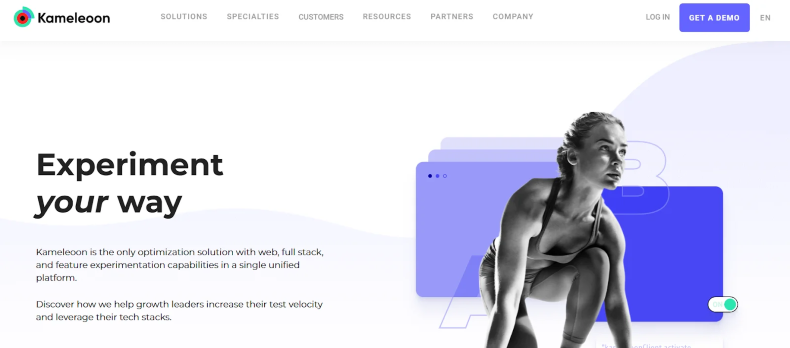
Key Features
- Linking tests with corporate goals: Kameleoon allows you to track how split testing impact key metrics like conversion rate, customer retention, or engagement. You can use existing goals or create your own to measure progress.
- Simulate and share tests: Kameleoon’s simulation tool helps you test hypotheses to ensure they work for your target audience. You can also easily share test experiences with stakeholders within the platform to gain approval and move forward.
- Extensive widget library: With Kameleoon’s widget library, you can access and customize a range of widgets to enhance user experience across all devices.
Pricing: available on request.
11. AB Tasty
If your business just starts with conversion optimization, AB Tasty is an affordable, easy-to-use tool. It offers a range of features, including out-of-the-box widgets, multivariate testing, client and server-side testing, as well as search and recommendation functions. The platform also supports personalization and AI targeting, with responsive customer support and over 1,000 companies worldwide.
The platform gives you full control over testing. You can trigger tests based on factors such as URL, geolocation, demographics, and more. Additionally, AB Tasty lets you enhance its data by integrating information from existing CRMs.
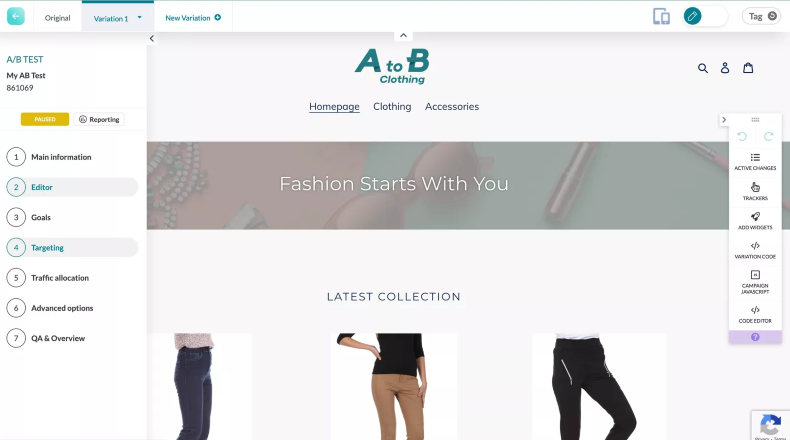
Key Features
- Focus on e-commerce: AB Tasty allows you to analyze ROI, understand user behavior, and personalize experiences using transactional and location-based data to enhance e-commerce performance.
- Enterprise companies: The platform is scalable and designed to meet the needs of large organizations.
Pricing: available on request.
12. Flagsmith
Flagsmith helps you manage feature flags and remote configurations for mobile, web, and server-side applications. It allows you to use multivariate flags as a bucketing engine, placing users into different testing groups and controlling the user experience during tests.
Flagsmith is designed for data-driven front-end and user experience teams who aim to improve efficiency in feature development.
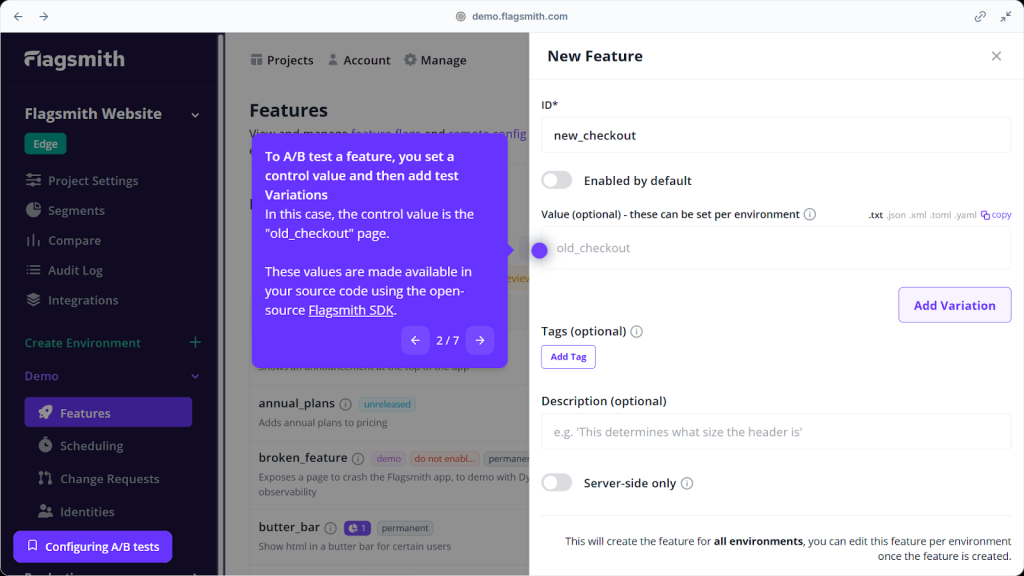
Key Features
- Manage flags across multiple platforms: Flagsmith allows you to control feature flags on mobile, web, and server-side apps.
- Integrations: Flagsmith integrates with various well-known analytics tools, enabling you to gather insights and analyze the impact of your feature changes.
- Remote configuration: You can toggle features on and off remotely without needing to modify your code.
Pricing: Flagsmith is open source and available on a BSD 3-clause license. For teams looking to manage their infrastructure, Flagsmith can be hosted entirely on-premises with pricing available on request. They also offer a cloud solution for free up to 50,000 requests per month.
13. Optimizely
Optimizely is an experimentation platform focusing on enterprises. It offers a powerful toolset aimed at websites with high traffic.
Optimizely’s Web Experimentation enables you to run multiple experiments on the same page without interference. This helps you ensure safe and efficient testing.
Beyond websites, Optimizely also extends its capabilities to mobile apps, messaging platforms, and other channels.
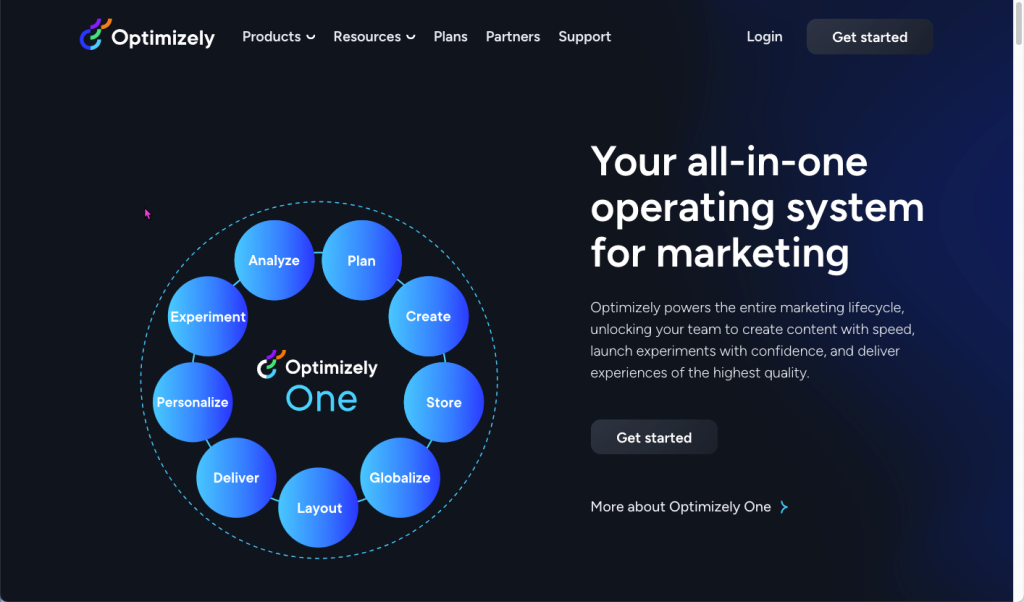
Key Features
- Experiment collaboration: Optimizely’s collaboration tools allow teams to work together on tests.
- Multi-armed bandit & Stats accelerator: These features speed up your split testing process by maximizing yield and reducing the time needed to achieve statistically significant results.
Pricing: available on request.
14. Unleash
As a feature management platform, Unleash provides a comprehensive overview of all features across your apps. It empowers A/B tests through feature toggles and precise user targeting.
While Unleash allows you to define the rules for your experiments, it doesn’t offer full A/B test management tools. To visualize and analyze results, you’ll need to integrate it with analytics platforms like Google Analytics.
Unleash is perfect for autonomous development teams seeking a simple way to test, validate, and safely deploy new features.
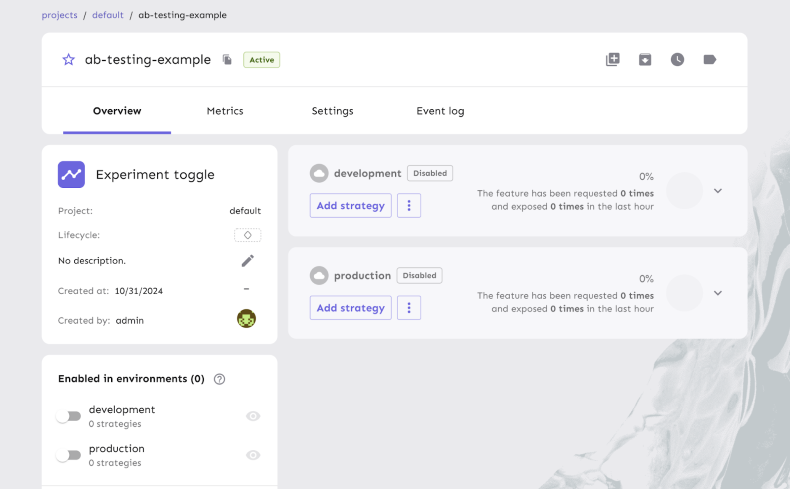
Key Features
- Extensive APIs: Unleash offers a wide range of Application Programming Interfaces (APIs), giving you the flexibility to integrate the platform with other tools and systems.
- Self-hosted and managed service: You can choose between a self-hosted option or a managed service, providing you with more control or convenience based on your needs.
Pricing
- Open-source version: Free
- Managed version: from $80/month
15. Mojito
Mojito is for developers and product teams who need a straightforward split testing platform that offers complete control and unlimited customization options.
The tool includes three modular components. It includes a front-end library for user tracking, data models and events for fast reporting, and customizable reporting templates for creating your own visualizations.
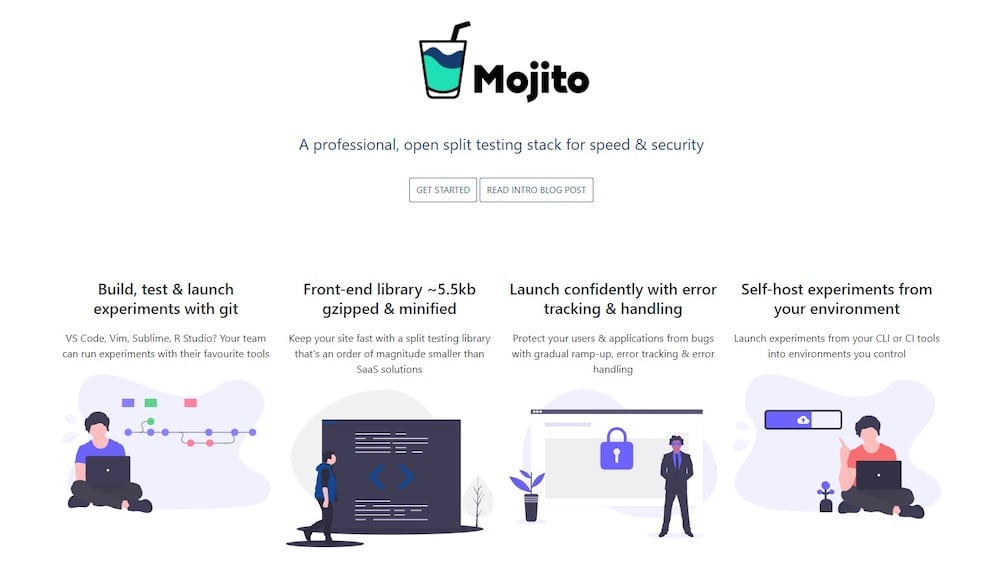
Key Features
- Simple APIs and unlimited customization: Mojito offers an easy-to-use interface, so you can fully customize your testing setup.
- No third-party needed: The platform provides built-in reporting tools, eliminating the need for third-party analytics services.
- Lightweight: The platform is designed to be lightweight, so it doesn’t slow down your page load times.
Pricing: Free
16. Omniconvert
Designed for website optimization, Omniconvert offers many features like A/B testing, surveys, web personalization, customer segmentation, and behavioral targeting.
With Omniconvert, you can generate reports on A/B tests, including details on test variations, conversion rates, and statistical significance.
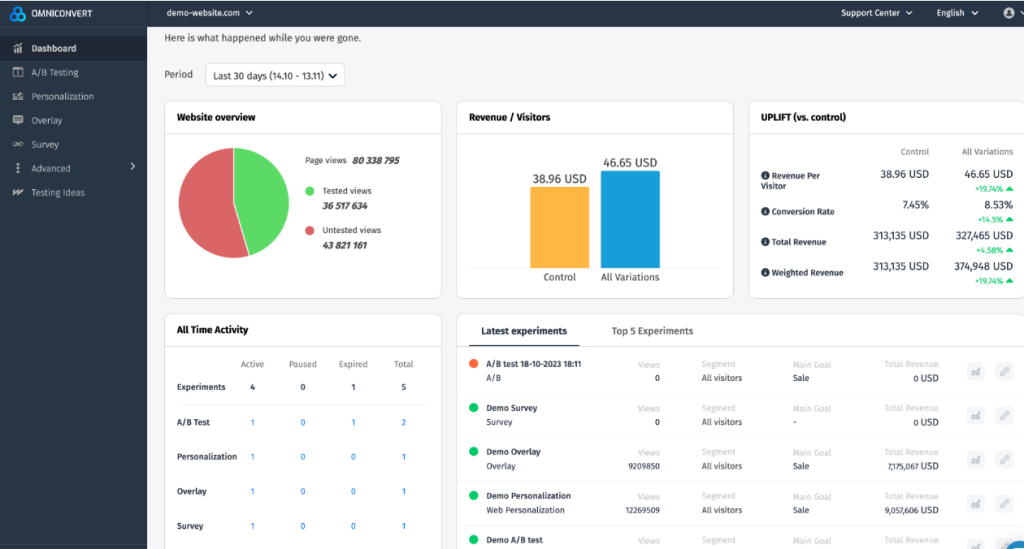
Key Features
- Stacked tests: Omniconvert allows you to perform stacked tests. You can start with split testing to create different landing pages. After that, instead of implementing the changes, you can use the winning variant as the control for a new test.
- No-code editor: The platform enables you to create A/B test variations without needing any coding skills. You can easily make changes to web pages, such as modifying colors, text, or elements, using the intuitive interface that anyone can use.
Pricing
- A/B testing tools: $273/month for a maximum of 50k monthly website views.
- Enterprise plan: available on request
17. NOSTO
With NOSTO, retailers can design and implement personalized digital experiences that enhance the relevance and value of every customer interaction.
The platform is user-friendly with options like comprehensive merchandising and automated Dynamic Bundles.
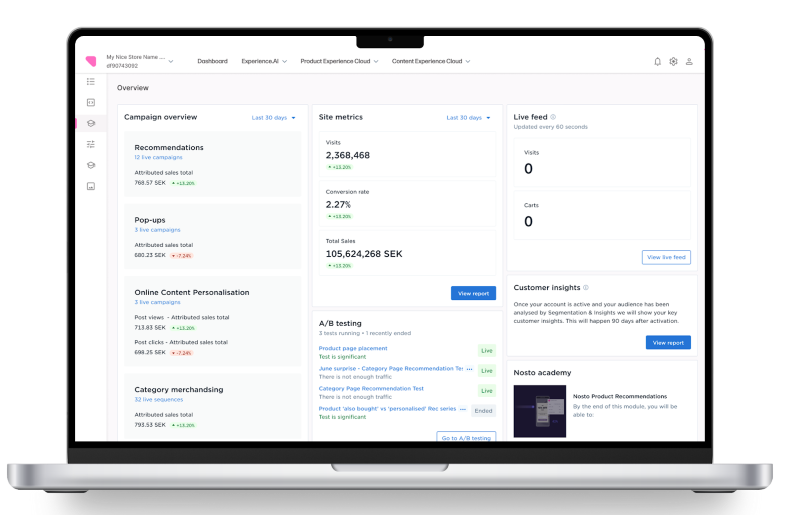
Key Features
- Merchandising Strategies: NOSTO helps you analyze the performance of different test segments. This analysis guides you in applying the right strategies for various customer lifecycle and affinity groups.
- Different Types of Tests: You can run various test types across multiple page elements.
- Intuitive User Interface & Integration: With NOSTO’s easy-to-use interface, you can quickly set up tests.
Pricing: available on request.
18. InstaPage
InstaPage provides a range of tools to enhance your landing pages for better conversion rates.
The platform enables you to track visitor behavior and experiment with various elements, such as form length, background images, layouts, and designs. This allows you to refine these components based on insights and adapt them to better engage your target audience.
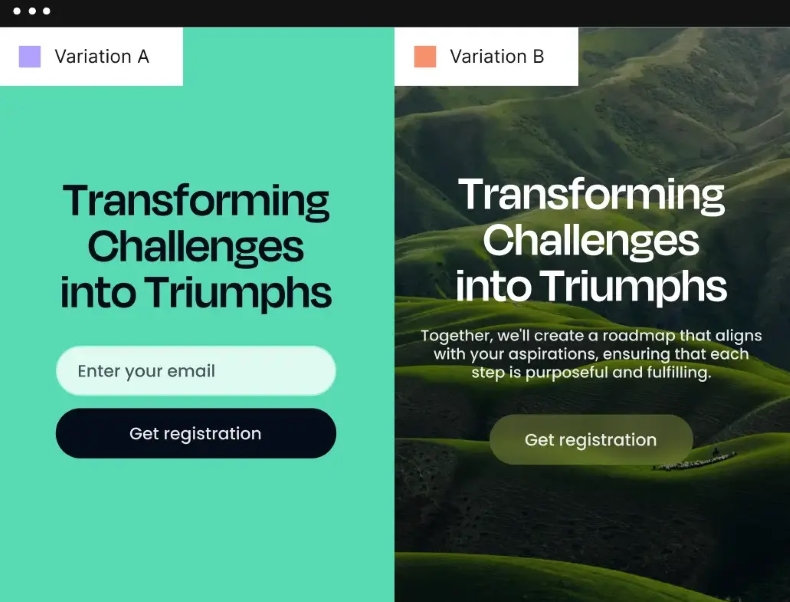
Key Features
- AI Experiments: Unlike traditional A/B tests, which split traffic evenly, this approach continually adjusts to focus on the more successful variations.
- Heatmaps: Track user interactions such as mouse movements, clicks, and scrolling behavior. This helps you gain insights into what elements may need improvement.
Pricing: available on request.
19. Adobe Target
For enterprise businesses, this platform provides powerful split testing and personalization tools.
With advanced features such as AI-driven personalization, omnichannel testing, and server-side testing, the tool helps optimize the entire customer journey across web, mobile, and other channels.
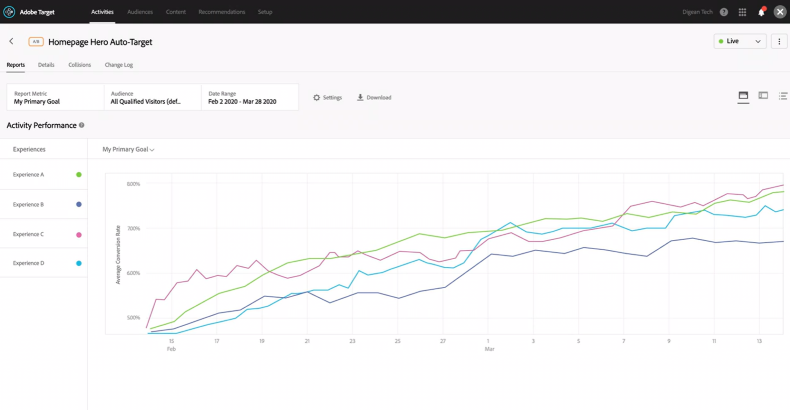
Key Features
- Server-side and client-side testing: Perform tests without affecting the performance of your website, whether on the server or client side.
- Omnichannel personalization: Offer personalized experiences across multiple channels.
- AI-powered automation: Streamline testing and personalization processes through AI-driven automation.
- Integrations: Seamlessly integrate with Adobe Experience Cloud, Adobe Analytics, and other third-party tools for a more connected experience.
Pricing: available on request.
20. SiteSpect
SiteSpect is an advanced A/B testing and optimization platform that specializes in server-side testing and scalability. It is ideal for technically proficient organizations that require detailed data insights, high performance, and secure testing. The platform provides features like A/B testing, personalization, rollouts, and AI-powered recommendations.
Its key strength is the ability to add product recommendations anywhere on its webpage, without needing help from the development team.
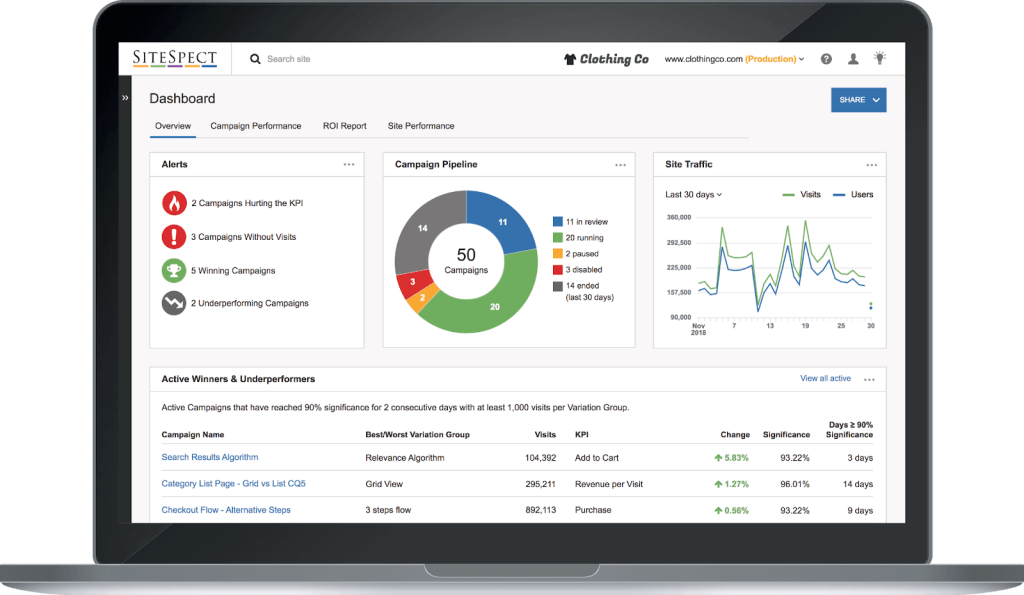
Key Features
- Server-side testing: Conduct tests without affecting the user experience.
- Feature rollouts: Control and manage feature releases seamlessly, without the need for code changes.
- AI-powered recommendations: Suggest products to users based on their behavior and interactions.
Pricing: available on request.
Criteria for Choosing The Best Split Testing Platform
When selecting a split testing platform, it’s essential to consider several key factors. Below, we outline the main criteria that will help you choose the best platform for your needs!
The Tool’s Ease of Use
Ease of use should be a top priority when choosing a split testing platform. Look for platforms like Statsig or Omniconvert that let you create and adjust variations without needing advanced coding skills.
For smooth analysis, an organized dashboard is also essential. This allows your team to set up, manage, and analyze tests together, leading to quicker results and a more efficient optimization process.
Besides, the tool should have a gentle learning curve, so you can focus on refining hypotheses and enhancing the user experience.
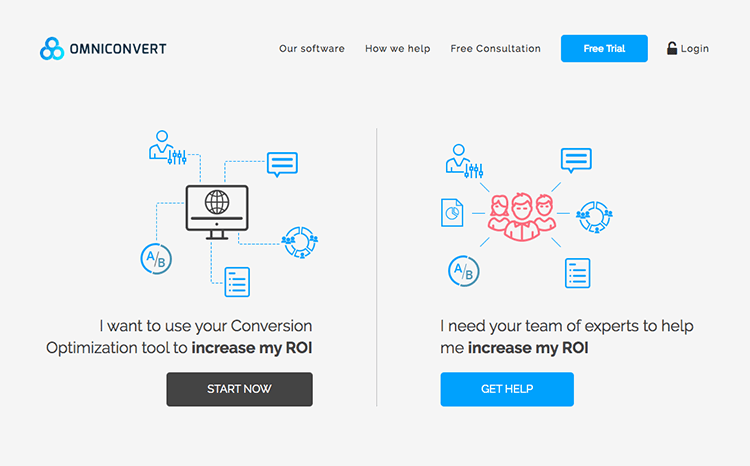
Integrations
A split testing platform should never work alone. Its value largely depends on how well it integrates with the marketing and analytics tools you already use.
Smooth integrations with platforms like Google Analytics, Google Tag Manager, CRM systems, email marketing software, and other essential tools can simplify your workflow.
>>> Read more: Google Tag Manager Explained: What Is It & How To Set Up
The Level Of Expertise Required
A split testing platform are designed to meet many levels of user expertise. Some are for beginners with simple setups. On the other hand, more advanced platforms provide powerful customization options but require a deeper understanding of coding and statistical analysis.
It’s important to evaluate your team’s skill level when choosing a platform. If your team has limited technical experience, opting for AB Tasty or GA4 will be more effective.
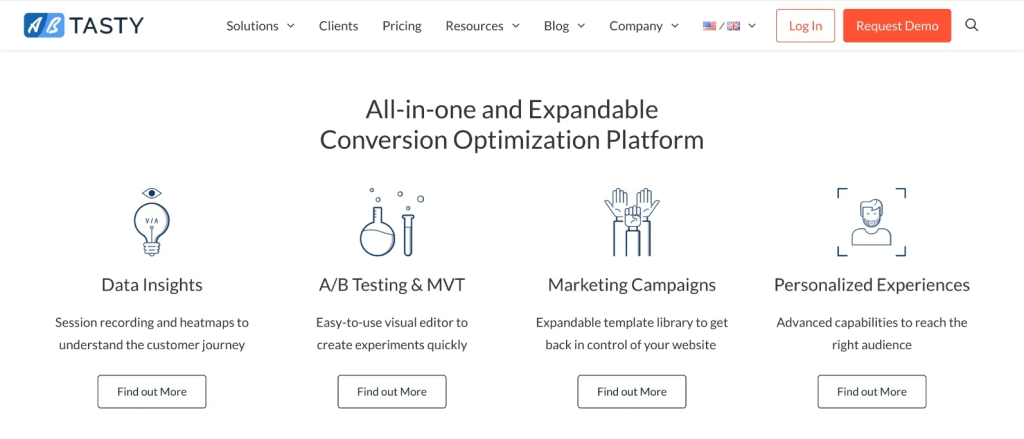
Pricing And Scalability
When choosing a split testing platform, pricing, and scalability are key factors that affect your budget and long-term strategy.
Some platforms offer free plans, which are great for small businesses or those new to split testing. However, as your testing needs increase or you require more advanced features, a paid plan may be necessary.
Also, the platform should be able to scale as your website traffic rises while staying within your budget. Be sure to choose a platform with clear pricing and avoid hidden fees or restrictions.
Wrap Up
Choosing the best split testing platforms is crucial for driving conversions. By considering factors like ease of use, integrations, expertise requirements, pricing, and scalability, you can find a platform that suits your business needs.
Whether you’re a beginner or tech-savvy, the platforms we’ve highlighted offer a range of tools to help you improve performance. Try out now to make the most of your optimization efforts!










